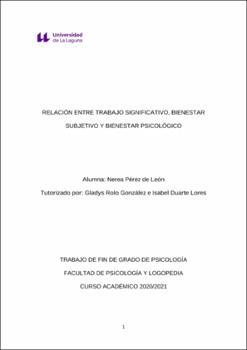Relación entre trabajo significativo, bienestar subjetivo y bienestar psicológico.
Author
Perez De Leon, NereaDate
2021Abstract
El presente estudio tiene como propósito comprobar la relación existente entre
el trabajo significativo y el bienestar (subjetivo y psicológico) en personas con trabajo y
en situación de desempleo. Se contó con la participación de 214 personas que
cumplimentaron las escalas: Trabajo Significativo (WAMI), Vida Significativa (MLM),
Afecto Positivo y Negativo (PANAS) y Satisfacción Vital (SWLS). Los resultados indican
que existe una relación significativa y positiva entre trabajo significativo y significación
vital; asimismo, el desempeñar un trabajo que se percibe como significativo interviene
en la percepción de bienestar subjetivo (en la dimensión de afecto positivo y en la
satisfacción con la vida). Además, se encontró que las personas que trabajan presentan
puntuaciones medias significativamente más altas en la variable vida significativa que
las personas desempleadas. Por último, se confirmó la cuarta hipótesis que proponía la
existencia de diferencias en bienestar entre trabajadores/as y desempleados/as, siendo
el afecto negativo significativamente mayor y la satisfacción vital significativamente
menor en este último grupo. The purpose of the present study was to test the relationship between meaningful
work and well-being (subjective and psychological) in employed and unemployed
people. The study involved 214 participants who completed the scales: Meaningful Work
(WAMI), Meaningful Life (MLM), Positive and Negative Affect (PANAS) and Life
Satisfaction (SWLS). The results indicate that there is a significant and positive
relationship between meaningful work and life significance, and that doing work that is
perceived as meaningful has an impact on the perception of subjective well-being (in the
dimension of positive affect and life satisfaction). In addition, it was found that working
people have significantly higher mean scores on the meaningful life variable than
unemployed people. Finally, the fourth hypothesis proposing the existence of differences
in well-being between working and unemployed people was confirmed, with negative
affect being significantly higher and life satisfaction significantly lower in the latter group.





